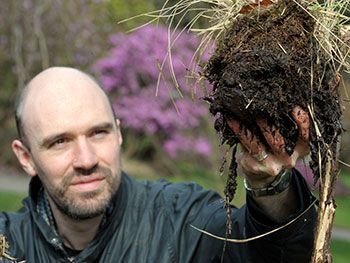University News Last updated 15 September 2014

Major organisations and celebrities are backing a professor's call to protect precious wildlife and preserve climate change, by pledging to go 'Peat Free.'
Inspired by research undertaken by Professor Mark Reed, from Birmingham City University, Project Maya has launched a campaign this week highlighting the environmental impacts we face if UK gardeners continue to use peat compost.
Campaign spokesperson, Professor Mark Reed, said: "Like most of us, I'm a weekend gardener, and for the majority of gardeners like me, there really is no excuse not to use peat-free compost. And yet most people I meet have no idea of the damage caused by buying peat-based composts.
"For me, peatlands are a fascinating place to think about our relationship with nature. So many of us overlook peatlands as bleak, featureless and inhospitable places, without realising that we all depend on them for the water we drink and for regulating our global climate. Most of us don't even notice the internationally important species and habitats we're trudging through when we go hill walking."
UK gardeners make a significant contribution to improving the environment for nature; growing flowers that are perfect for pollinators, along with fruit and vegetables, saving on packaging, and carbon used in transportation. Yet, each month UK gardeners are using enough peat to fill the equivalent of 69 Olympic swimming pools, with no idea of the damage they are causing by doing so. An average 100 litre bag of peat compost takes around 100 years to develop. In this time, a bag this size will have absorbed as much carbon dioxide as you would emit by driving from London to Birmingham and back in a petrol VW Golf.
Peat is used in compost because it's cheap, light, retains moisture and stores nutrients. However according to Professor Reed, we do not need to use it. Most amateur gardeners wouldn't notice a difference in the performance of peat versus peat-free composts, but switching to peat-free would make a significant difference to our peatlands. And like the switch to low-energy lightbulbs (accompanied by the same initial concerns over poor product performance), if we don't start buying peat-free composts voluntarily, they may be banned. Already, the Government has set a target to phase out the use of peat by amateur gardeners in England by 2020. They are monitoring peat use and will be reviewing progress next year to see if "additional policy measures are necessary".
Peatlands are a vast green lung that provides unique places for recreation and habitats for some of our most threatened wildlife, whilst absorbing carbon dioxide from the atmosphere. An area of healthy peatland the size of a rugby pitch can absorb the equivalent of four return trips from London to Edinburgh by car every year. That's approximately four times more efficient at carbon absorption than a forest. Yet, just 6 per cent of our peatlands remain - 6000 hectares.
The campaign has already attracted wide support from organisations and individual supports such as:
- Designer and environmental activist, Vivienne Westwood DBE
- Naturalist, author and broadcaster, Simon King OBE
- BAFTA award winning television producer, Stephen Moss
- The John Muir Trust
- The IUCNs Peatland Programme
- Plantlife
- Climate Revolution